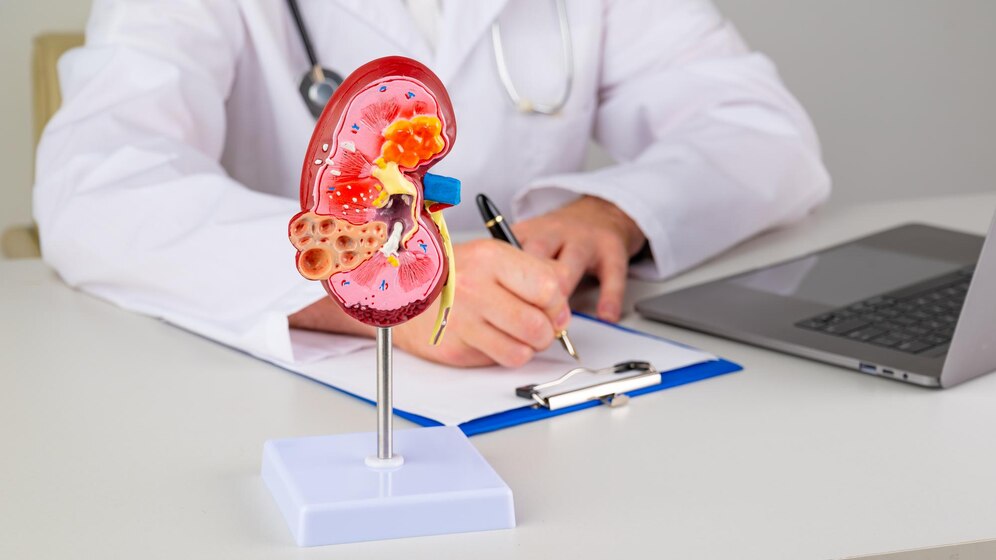Imagine waking up feeling unusually tired. You shrug it off, attributing it to a busy week. But the fatigue persists, accompanied by a nagging itch and swelling in your ankles. You might chalk it up to stress or a bad night’s sleep. However, these seemingly minor symptoms could be hiding a more critical issue: kidney failure.
Kidneys, those two bean-shaped organs nestled near your lower back, play a vital role in keeping you healthy. They act as the body’s filtration system, removing waste products, excess fluids, and toxins from your blood. But what happens when this filtration system starts to malfunction? That’s where kidney failure comes in.
Understanding Kidney Failure: The Basics
Kidney failure, also known as renal failure, describes the inability of the kidneys to function adequately. This can be a temporary condition called acute kidney injury (AKI) or a progressive, long-term condition known as chronic kidney disease (CKD), with kidney failure being the most severe stage.
Think of your kidneys as sieves. When working properly, they allow essential nutrients and fluids to pass through while filtering out waste products. In kidney failure, the sieves become clogged or damaged, leading to a buildup of waste and imbalances in your blood chemistry. This disrupts vital bodily functions and can cause a cascade of health problems if left untreated.
The Two Faces of Kidney Failure: Acute vs. Chronic
While both types of kidney failure affect your kidneys’ ability to filter waste, they differ in their onset and progression.
-
Acute Kidney Injury (AKI): This is a sudden and rapid decline in kidney function, often occurring within hours or days. It can be caused by severe dehydration, blood loss, or blockage in the urinary tract. With prompt medical intervention, AKI can sometimes be reversible.
-
Chronic Kidney Disease (CKD): This is a gradual, long-term loss of kidney function. It often develops over months or years and has several potential causes, including diabetes, high blood pressure, and certain autoimmune diseases. Unfortunately, CKD is not reversible, but its progression can be slowed with proper management.
Warning Signs: When to Listen to Your Body
Early detection is crucial in managing kidney failure. While the symptoms may vary depending on the severity, here are some common red flags to watch out for:
- Changes in urination: This includes a decrease in urine output, blood in the urine, or frothy urine.
- Fatigue and weakness: Feeling constantly tired and lacking energy.
- Swelling: Puffiness around the eyes, ankles, or feet due to fluid retention.
- Loss of appetite: Nausea, vomiting, or a general disinterest in food.
- Sleep problems: Difficulty falling asleep or staying asleep.
- Itchy skin: Unexplained dry and itchy skin.
- High blood pressure: Uncontrolled hypertension can worsen kidney function.
- Trouble concentrating: Difficulty focusing or thinking clearly.
Protecting Your Kidneys: Taking Charge of Your Health
Fortunately, several lifestyle modifications can help maintain healthy kidneys and potentially slow the progression of CKD. Here’s what you can do:
- Manage diabetes and high blood pressure: These conditions are leading causes of kidney failure.
- Maintain a healthy weight: Obesity is a risk factor for CKD.
- Stay hydrated: Drinking plenty of water helps your kidneys function optimally.
- Eat a healthy diet: Focus on a balanced diet that’s low in salt, processed foods, and animal protein.
- Limit alcohol and smoking: These habits can damage your kidneys.
- Don’t overuse over-the-counter pain relievers: Excessive use of certain pain medications can be harmful to the kidneys.
- Get regular checkups: Schedule regular doctor visits and screenings to monitor your kidney function.
- Educate yourself: The more you know about kidney health, the better equipped you are to protect your kidneys.
Remember, early detection and intervention are key in managing kidney failure. By being aware of the symptoms and taking steps to promote kidney health, you can empower yourself to take charge of your well-being.
Taking care of your kidneys is an investment in your overall health and well-being. By prioritizing healthy habits and seeking professional guidance when needed, you can ensure these silent sieves continue to work their magic for years to come.
